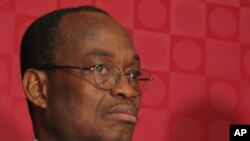A new Ivory Coast ambassador has arrived in the United States, as part of a diplomatic offensive by the internationally-recognized President-elect Alassane Ouattara against incumbent President Laurent Gbagbo who is refusing to leave power.
Daouda Diabate spoke to dozens of Ivorian nationals who gathered at the Embassy Suites hotel in Washington, shortly after he had landed at Dulles International airport.
He explained he was part of a team trying to get the cocoa-rich but divided and struggling Ivory Coast, known in French as Cote d'Ivoire, back on track.
"Cote d'Ivoire used to be qualified as an economic miracle in Africa and this is the kind of thing that we know that once again we can achieve. We have the people. We have the resources. We have the opportunities. We just need peace and stability and we just want to see the right man at the right place and do the job, with democracy, with good governance and all these things Cote d'Ivoire can come back to that kind of success," he said.
Diabate, a former ambassador to the United States under Mr. Gbagbo, was more recently ambassador in Brazil, before being appointed back to the United States by Mr. Ouattara.
After the reception, he rushed off to the State Department to finalize a process which he hopes will get him recognized by U.S. authorities and at work at the Ivory Coast embassy in Washington before the end of February.
Balla Sidibe, who recently led a protest of Ivory Coast nationals outside the White House, greeted the new ambassador's arrival, but said even if he gets to work in Washington, the battle remains in the Ivorian commercial capital Abidjan.
"We need to also acknowledge the fact that right now Cote d'Ivoire is being taken hostage by one individual that does not want to quit. He is a sore loser. His name is former President Gbagbo," Sidibe said.
One of the organizer's of Tuesday's event Toumani Sissoko was one of many who took time off work to attend.
He said he hopes the U.S. government will do more than just current economic sanctions to help oust Mr. Gbagbo, who remains in control of the army, ports and state media.
"I think the United States has to show force to Mr. Gbagbo without using it first. Showing force means the United States can bring some military, some aircraft, some boats, and all these things and show to Mr. Gbagbo we are ready to strike and Mr. Gbagbo knows how powerful the U.S. army is so he may leave," said Sissoko.
That option has not been raised publicly by U.S. officials who say Mr. Gbagbo stole the election. But officials from the West African regional grouping ECOWAS have raised the possibility of outside military intervention with a U.N. mandate as a last resort.
A panel of African heads of state recently mandated by the African Union sent negotiators to Abidjan this week as part of a new month-long mediation attempt.
Last year's much delayed U.N.-sponsored election which was supposed to reunite Ivory Coast, divided in two since 2002, has instead intensified divisions and led to dozens more deaths.
After national election commission officials gave the victory to Mr. Ouattara by a wide margin following the second round November run-off, the country's constitutional council threw out votes from the rebel-held north, erasing the first result and instead leaving the state's power in the hands of Mr. Gbagbo. The incumbent has said any Ouattara diplomatic appointment is illegitimate and that he will reciprocate by forcing ambassadors to leave Ivory Coast.
Mr. Ouattara's appointment to the United Nations Youssoufou Bamba has already started working in New York, and was also present at Tuesday's event in Washington. Another Ouattara appointee, Ally Coulibaly, now heads the Ivorian embassy in the former colonial power France, even though he initially had to use the services of a locksmith to force his entry into the compound in Paris.
Calls to the Ivorian embassy in Washington on Tuesday to see if employees there would cooperate with the scheduled handover went unanswered.
New Ivory Coast Ambassador Arrives in US




